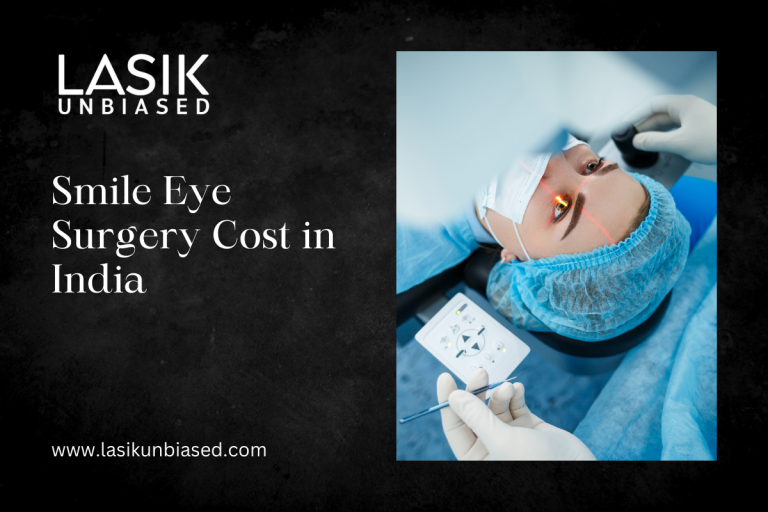SMILE (Small Incision Lenticule Extraction) is an advanced laser eye surgery used to treat refractive vision problems like myopia (nearsightedness) and astigmatism. Compared to traditional LASIK, SMILE is a minimally invasive procedure that offers a faster recovery time and fewer risks, such as dry eyes. With its growing popularity, many people consider SMILE surgery as a way to achieve clear vision without needing glasses or contact lenses. The cost is one of the most important factors to consider when undergoing this surgery. This article will explore the cost of SMILE eye surgery in India, the factors affecting the price, and what you can expect during your treatment.
Average Cost of SMILE Eye Surgery in India
The cost of SMILE eye surgery in India can vary depending on several factors, but on average, it typically ranges between ₹50,000 to ₹65,000 per eye. This price is significantly lower than the cost of similar procedures in countries like the United States, the United Kingdom, and other Western nations, making India an attractive destination for those seeking affordable vision correction surgery.
While the cost is generally lower in India, it’s essential to note that the price can fluctuate depending on the clinic, location, surgeon’s experience, and the technology used during the procedure. Larger cities with more advanced medical infrastructure, such as Delhi, Mumbai, Bengaluru, and Chennai, tend to have higher prices than smaller towns or rural areas.
Factors Influencing the Cost of SMILE Surgery
Several factors play a role in determining the cost of SMILE eye surgery in India. These factors can include:
1. Reputation of the Clinic and Surgeon
The reputation of the clinic and the experience of the surgeon can significantly impact the cost of your procedure. Highly experienced and well-known ophthalmologists or clinics with advanced technology tend to charge more for their services. However, opting for a reputable clinic ensures you receive top-quality care, advanced equipment, and the best possible results.
2. Technology and Equipment Used
SMILE surgery is performed using a femtosecond laser, which is a highly advanced piece of technology. The quality of the laser used can affect the price of the procedure. Clinics that use the latest and most sophisticated equipment may charge higher fees. Still, they can offer more precise and accurate treatment, resulting in better outcomes and fewer complications.
3. Location of the Clinic
The clinic’s location is another critical factor affecting SMILE surgery’s price. Clinics in metropolitan cities like Delhi, Mumbai, and Bengaluru usually have higher operating costs, which are passed on to patients in the form of higher surgery fees. On the other hand, smaller cities and towns may offer lower prices, although the quality of treatment may be equally good.
4. Consultation Fees and Follow-up Costs
In addition to the surgery cost, you may need to factor in consultation fees and follow-up appointments. Most clinics offer a package deal that includes the cost of pre-surgery consultations, diagnostic tests, the surgery itself, and post-surgery follow-ups. It’s essential to inquire about what’s included in the price to avoid any surprises. Some clinics may offer additional services, such as free follow-up visits for the first few months after surgery.
5. Customized Treatment
If your refractive error is more complex or if you require customized treatment, the cost of SMILE surgery may be higher. Customized treatments, which involve more precise laser mapping and adjustments based on your eyes’ specific needs, are usually more expensive but can provide better outcomes for people with high prescriptions or irregular corneas.
Does Insurance cover SMILE Surgery?
In most cases, SMILE eye surgery is considered a cosmetic procedure, which is not typically covered by health insurance in India. However, some insurance providers may offer coverage for refractive eye surgery under certain conditions, especially if the surgery is necessary for medical reasons, such as treating a severe refractive error that glasses or contact lenses cannot correct. You should check with your health insurance provider to determine if any portion of the SMILE surgery cost can be reimbursed.
Financing Options for SMILE Surgery in India
Many clinics in India offer financing options to help make SMILE surgery more affordable. These financing plans allow patients to pay for the surgery in instalments, making the cost more manageable. Some clinics also offer discounts or packages, including additional services like free post-surgery consultations, vision check-ups, and follow-up visits. Before deciding, discussing the available payment plans with the clinic to find an option that suits your budget is essential.
Additional Costs to Consider
While the initial cost of SMILE surgery is important, there are other potential costs to consider. These might include:
- Pre-surgery diagnostic tests: Before undergoing SMILE surgery, your eye health must be evaluated. The cost of these tests is generally included in the overall surgery package, but confirming this with the clinic is a good idea.
- Post-surgery medications: You will likely be prescribed eye drops or other medications to aid the healing process. These medications may not be included in the surgery cost and may come at an additional expense.
- Travel and accommodation costs: If you are travelling from outside the city or country for the surgery, you will need to consider the cost of travel and accommodation and any potential time off work for recovery.
Why Choose India for SMILE Surgery?
India has become one of the leading destinations for medical tourism, especially for eye surgeries like SMILE. The country offers world-class healthcare services at a fraction of the cost compared to Western nations, making it an attractive option for international patients. Many of India’s top hospitals and eye care centres have state-of-the-art technology and are staffed with highly trained and experienced surgeons. This combination of high-quality care and affordability has made India popular for those seeking refractive eye surgery.
Moreover, India’s cultural and linguistic diversity makes it easier for international patients to find services in their native language, and many clinics offer assistance with travel and accommodation arrangements.


